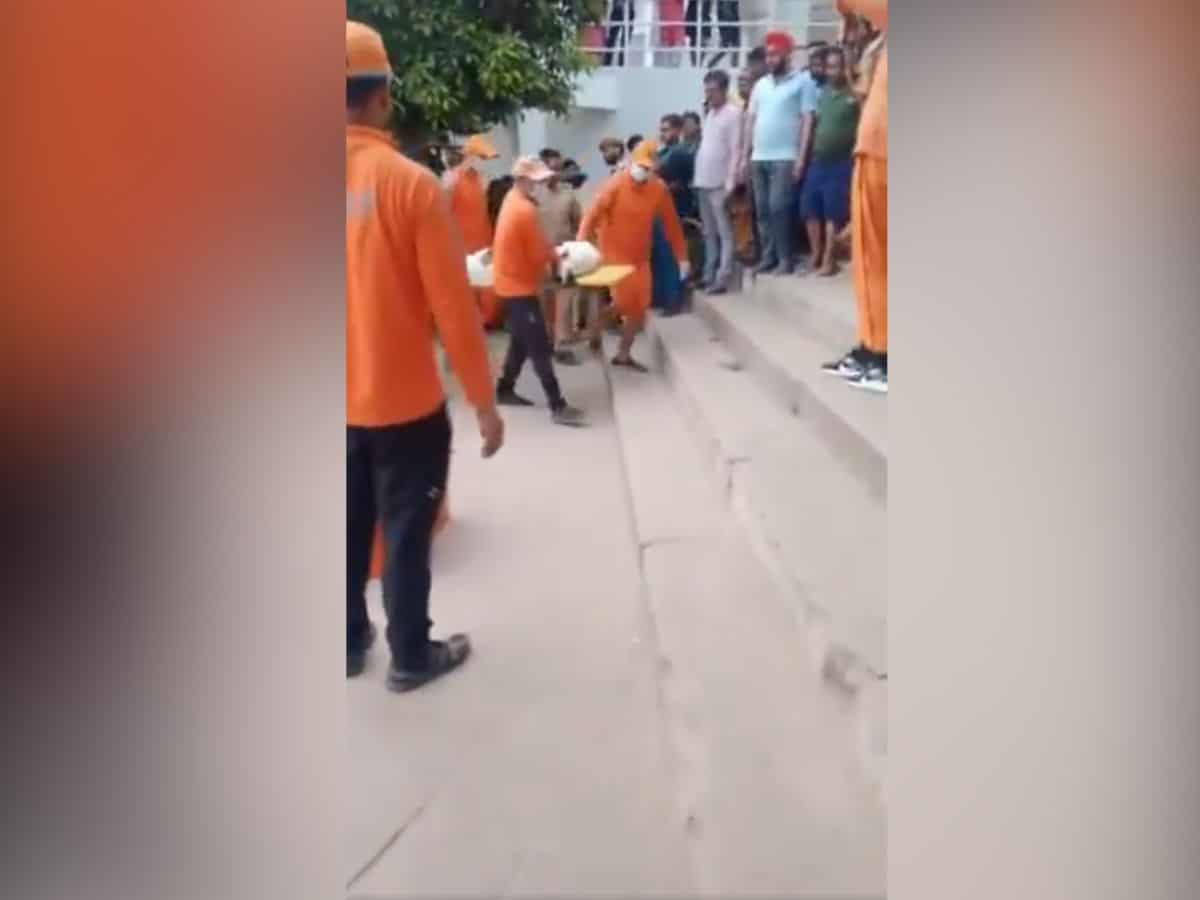06.04.2024.UNTOUCHABLES NEWS.BY Sivaji.ceo,Chennai.26.
Dalit activist Shoma Sen will come out of jail after 6 years, Supreme Court grants bail

Former Nagpur University professor Shoma Sen has got a big relief from the Supreme Court. Supreme Court has granted bail to Shoma Sen after 6 years. She will not be able to go out of Maharashtra during bail.
ByRahul Mahajan
New Delhi\Mumbai: The Supreme Court on Friday granted bail to Professor Shoma Sen, accused in the Bhima Koregaon case. He was in jail since June 6, 2018. Shoma Sen is a former professor at Nagpur University. He was booked under the Unlawful Activities Prevention Act 1967 (UAPA) for alleged Maoist links in connection with the Bhima Koregaon case. Shoma Sen will not be able to go out of Maharashtra during the bail period without informing the Special Court. They will have to give information about their mobile number.
It is noteworthy that in the year 2018, Pune Police had made several arrests in the Bhima-Koregaon caste violence case. Apart from Shoma Sen, Surendra Gadling, Mahesh Raut, Sudhir Dhawale and Rona Wilson were arrested from different cities. It is said that he was already being monitored on suspicion of his links with Maoists. Nagpur University had suspended him.
Shoma Sen is a Dalit activist
Shoma Sen is a human rights activist and Dalit activist. After his arrest, daughter Komal Sen alleged that he had never been arrested or questioned before. She had claimed that apart from Dhawale, Shoma did not know any of the arrested people. He had alleged that his arrests were made to silence those who raised their voice for the rights of Dalits. Komal had said that the political environment of the country has become such that no one is ready to listen to the people of the so-called lower community and when they speak, it becomes necessary to put them down.
Courtesy: Hindi News
Shahjahanpur: Made relations with Dalit girl, then said – accept Islam or give five lakh rupees

Shahjahanpur, Amrit Vichar. A Muslim youth from Lakhimpur Kheri area had a relationship with a Dalit girl from Sindhauli police station area by pretending to be a Hindu. During this the accused took her photographs. Now the accused started demanding from the girl to convert to Islam or else pay Rs 5 lakh. Based on the complaint of the victim, Sindhauli police has registered a report and started investigation.
By Vikas Babu
A Dalit girl resident of a village in Sindhauli police station area told that her father passed away ten years ago. He became friends with a boy named Rakesh two years ago. Rakesh started talking to her on the phone, after which they grew closer and started meeting her.
During this, Rakesh cheated and forcefully had physical relations with her and took her photographs. About four months ago, when she met Rakesh, she came to know that Rakesh is not a Hindu, his real name is Talib Khan and he is a resident of Jeviganj district-Kheeri.
When he came to know the truth, he stopped meeting her. After this, Talib Khan started calling him on his mobile and threatening him and his family. The victim girl told that the accused said that either accept Islam or give us five lakh rupees, otherwise we will make your photo viral.
The victim said that she and her family are troubled by this. On the complaint of the victim, the police have registered a case against the accused Talib Khan under the SC-ST Act including rape, extortion and threatening.
Courtesy: Hindi News
‘Ideological Battle’ To ‘Caste Census’: Congress Lok Sabha Poll Manifesto Emphasises Social Justice For Youth, Women And Poor

Apart from the caste census, the Congress party also offered 25 guarantees under three central themes – work, wealth and welfare.
Abhik Bhattacharya
With the Congress party releasing its poll manifesto for the 2024 Lok Sabha elections on Friday, the central focus of the contest is all set to be ‘a contest over ideology’. While responding to a question pertaining to the probable face of the opposition INDIA bloc, senior Congress leader Rahul Gandhi said, “It is an ideological battle and if we come to power, the alliance partners together would decide the name.”
Though the question of ideology directly didn’t come up in the speeches of the party president Mallikarjun Kharge or the drafting committee chairperson P Chidambaram, the proposal to amend the anti-defection law showed the party’s insistence on ideology. Emphasising the necessity of such a law, Chidambaram said, “Those who defect need to be immediately disqualified”. This narrative of disqualifying defected candidates has been doing the rounds for a while, even from the civil society organisations.
Recently, in Pune, some unclaimed banners came up across streets saying that the candidates could seek votes only if they promise not to defect in the middle of their tenure. And for Congress, it becomes essential at a time when several of its leaders have left the organisation and joined the BJP in the last few years. The national spokesperson of the party, Gaurav Vallabh’s statement that he couldn’t stay with the party where he had to raise anti-Sanatan slogans and his consequent move to join the BJP also was not received well by the party, say insiders.
Notably, another major ideological contention for the Congress – as found in the manifesto – lies in the promise of the nationwide caste census. The grand old party has been seeking caste census since Bihar CM Nitish Kumar – who was also a former ally of the INDIA bloc and later jumped the boat to join NDA – conducted a caste survey in the state and released the report. Gandhi, during his Bharat Jodo Nyay Yatra, raised the caste census issue on many occasions. Addressing the yatra, he said that neither the corporate nor media houses in the country have adequate representations from the OBCs, Dalits, Adivasis and other marginalised communities.
The promise of caste census appears to be a significant one as it has been made on the birth anniversary of Babu Jagajivan Ram, a Dalit Congress leader who was with the party from 1947 to 1984. Kharge while evoking the legacy of Ram said, “The Congress party stands with the marginalised and upholds the values of social justice.”
Apart from the caste census, the party also offered 25 guarantees under three central themes – work, wealth and welfare. The party, if it comes to power, has promised to give Rs 1 lakh per year to the poor women besides offering Rs 1 lakh support for the apprenticeship of the youth. They would also bring MSP laws for which the farmers have been protesting for a long time now. The minimum wage of labourers would be fixed at Rs 400 a day, said Kharge referring to the performance of the UPA-1 government that brought in schemes like MNREGA and passed laws like Right to Information, Right to Education and National Food Security Act.
While talking about economic growth, former finance minister Chidambaram recounted how the UPA-1 government under the leadership of economist Dr Manmohan Singh achieved 8.5 per cent growth rate that got reduced to 5.9 per cent by the end of the last financial year. The Congress promises to boost growth by building industries, infrastructure and pulling in foreign investments, he added.
The guarantees of the Congress seem to be interesting ones at a time when ‘Modi’s guarantees’ have become the war cry of the ruling party. However, Chidambaram while debunking Modi’s guarantees as ‘empty guarantee’, said that Congress gives ‘concrete guarantee’ unlike Modi. He also asked, “Where are those 2 crores jobs that Modi ji had promised? Has the income of farmers doubled? I can give a list of failed promises.”
As caste census and the fight over ideology take centre-stage in Congress’s campaign, the question arises – will there be a resurgence of Mandal versus Kamandal politics in the coming days?
Courtesy : Outlook India
- Dalit sanitation worker dies inhaling poisonous gas in Varanasi
Ghurelal is survived by his wife and three children. He had been working as a sanitation worker for more than 15 years and earned a monthly salary of Rs 12,000.
 News Desk Follow on Twitter| Updated: 6th April 2024 9:45 pm IST
News Desk Follow on Twitter| Updated: 6th April 2024 9:45 pm IST
In a tragic incident, a sanitation worker from the Dalit community lost his life after reportedly being exposed to poisonous gases while cleaning a sewer in Uttar Pradesh’s Varanasi district.
The incident occurred at Bhaisapur Ghat in Adampura village. According to a sanitation worker, Ram Babu, there was a complaint regarding a sewerage blockade in front of the Ravidas temple at Rajghat, the Mooknayak reported.
“Ghurelal, 40, and Sunil from the Machhodari area to Bhaisasur Ghat were summoned to clean the sewerage. Upon arrival, Ghurelal and Sunil descended into the manhole using a rope,” Ram Babu was quoted by Mooknayak.
“After a while, Ghurelal stopped responding. Sunil emerged from the manhole and alerted others about the presence of poisonous gas. We informed our supervisor Babu Yadav who fled the scene. We then notified the Rajghat police, who promptly summoned the National Disaster Response Force (NDRF),” Ram Babu continued.
The NDRF team quickly rescued Ghurelal. He was taken to a nearby hospital but doctors pronounced him dead on arrival.
Ghurelal is survived by his wife and three children. He had been working as a sanitation worker for more than 15 years and earned a monthly salary of Rs 12,000.
Prime Minister Narendra Modi is the Member of Parliament from Varanasi.
Last year, the Supreme Court of India directed the Union and state governments to ensure the practice of manual scavenging is eradicated in a phased manner.
The apex court asked the Union and state governments to issue guidelines to protect a sanitation worker from entering into a manhole. The Union and state governments were ordered to give Rs 30 lakhs as compensation to a victim’s family.



Comments
Post a Comment